扬州大学英语口译笔译211翻译硕士英语+357英语翻译基础+448汉语写作与百科知识2018考研真题
四川大学外国语学院MTI翻译硕士357英语翻译基础448汉语写作与百科知识考
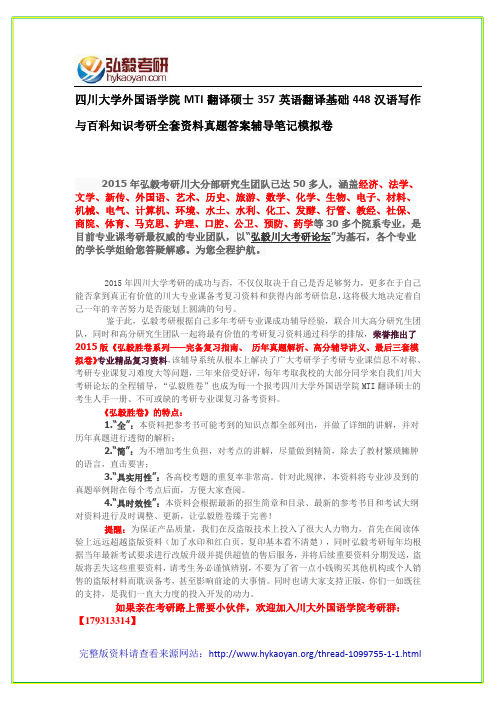
四川大学外国语学院MTI翻译硕士357英语翻译基础448汉语写作与百科知识考研全套资料真题答案辅导笔记模拟卷2015年弘毅考研川大分部研究生团队已达50多人,涵盖经济、法学、文学、新传、外国语、艺术、历史、旅游、数学、化学、生物、电子、材料、机械、电气、计算机、环境、水土、水利、化工、发酵、行管、教经、社保、商院、体育、马克思、护理、口腔、公卫、预防、药学等30多个院系专业,是目前专业课考研最权威的专业团队,以“弘毅川大考研论坛”为基石,各个专业的学长学姐给您答疑解惑。
为您全程护航。
2015年四川大学考研的成功与否,不仅仅取决于自己是否足够努力,更多在于自己能否拿到真正有价值的川大专业课备考复习资料和获得内部考研信息,这将极大地决定着自己一年的辛苦努力是否能划上圆满的句号。
鉴于此,弘毅考研根据自己多年考研专业课成功辅导经验,联合川大高分研究生团队,同时和高分研究生团队一起将最有价值的考研复习资料通过科学的排版,荣誉推出了2015版《弘毅胜卷系列——完备复习指南、历年真题解析、高分辅导讲义、最后三套模拟卷》专业精品复习资料,该辅导系统从根本上解决了广大考研学子考研专业课信息不对称、考研专业课复习难度大等问题,三年来倍受好评,每年考取我校的大部分同学来自我们川大考研论坛的全程辅导,“弘毅胜卷”也成为每一个报考四川大学外国语学院MTI翻译硕士的考生人手一册、不可或缺的考研专业课复习备考资料。
《弘毅胜卷》的特点:1.“全”:本资料把参考书可能考到的知识点都全部列出,并做了详细的讲解,并对历年真题进行透彻的解析;2.“简”:为不增加考生负担,对考点的讲解,尽量做到精简,除去了教材繁琐臃肿的语言,直击要害;3.“具实用性”:各高校考题的重复率非常高。
针对此规律,本资料将专业涉及到的真题举例附在每个考点后面,方便大家查阅。
4.“具时效性”:本资料会根据最新的招生简章和目录、最新的参考书目和考试大纲对资料进行及时调整、更新,让弘毅胜卷臻于完善!提醒:为保证产品质量,我们在反盗版技术上投入了很大人力物力,首先在阅读体验上远远超越盗版资料(加了水印和红白页,复印基本看不清楚),同时弘毅考研每年均根据当年最新考试要求进行改版升级并提供超值的售后服务,并将后续重要资料分期发送,盗版将丢失这些重要资料,请考生务必谨慎辨别,不要为了省一点小钱购买其他机构或个人销售的盗版材料而耽误备考,甚至影响前途的大事情。
首都经济贸易大学211《翻译硕士英语》357《英语翻译基础》448《汉语写作与百科知识》考试大纲
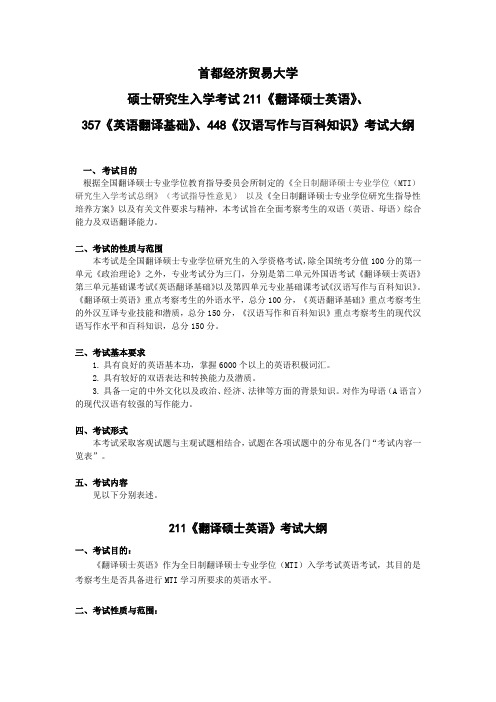
首都经济贸易大学硕士研究生入学考试211《翻译硕士英语》、357《英语翻译基础》、448《汉语写作与百科知识》考试大纲一、考试目的根据全国翻译硕士专业学位教育指导委员会所制定的《全日制翻译硕士专业学位(MTI)研究生入学考试总纲》(考试指导性意见)以及《全日制翻译硕士专业学位研究生指导性培养方案》以及有关文件要求与精神,本考试旨在全面考察考生的双语(英语、母语)综合能力及双语翻译能力。
二、考试的性质与范围本考试是全国翻译硕士专业学位研究生的入学资格考试,除全国统考分值100分的第一单元《政治理论》之外,专业考试分为三门,分别是第二单元外国语考试《翻译硕士英语》第三单元基础课考试《英语翻译基础》以及第四单元专业基础课考试《汉语写作与百科知识》。
《翻译硕士英语》重点考察考生的外语水平,总分100分,《英语翻译基础》重点考察考生的外汉互译专业技能和潜质,总分150分,《汉语写作和百科知识》重点考察考生的现代汉语写作水平和百科知识,总分150分。
三、考试基本要求1.具有良好的英语基本功,掌握6000个以上的英语积极词汇。
2.具有较好的双语表达和转换能力及潜质。
3.具备一定的中外文化以及政治、经济、法律等方面的背景知识。
对作为母语(A语言)的现代汉语有较强的写作能力。
四、考试形式本考试采取客观试题与主观试题相结合,试题在各项试题中的分布见各门“考试内容一览表”。
五、考试内容见以下分别表述。
211《翻译硕士英语》考试大纲一、考试目的:《翻译硕士英语》作为全日制翻译硕士专业学位(MTI)入学考试英语考试,其目的是考察考生是否具备进行MTI学习所要求的英语水平。
二、考试性质与范围:本考试是一种测试应试者单项和综合语言能力的尺度参照性水平考试。
考试范围包括MTI考生应具备的英语词汇量、语法知识以及英语阅读与写作等方面的技能。
三、考试基本要求1.具有良好的英语基本功,认知词汇量在10,000以上,掌握6000个以上的积极词汇,即能正确而熟练地运用常用词汇及其常用搭配。
扬州大学357英语翻译基础2014-2019年考研专业课真题试卷

扬州大学2014年考研专业课真题试卷(原版)
原版考研真题试卷
更多考研真题、笔记、模拟、题库、讲义资料就上精都考研网 /
扬州大学2015年考研专业课真题试卷(原版)
扬州大学2015年考研专业课真题试卷(原版)
扬州大学2015年考研专业课真题试卷(原版)
精都教育——全国 100000 考生的选择
2019年扬州大学考研专业课真题试卷
2019年扬州大学考研专业课真题试卷
ห้องสมุดไป่ตู้ 2019年扬州大学考研专业课真题试卷
2019年扬州大学考研专业课真题试卷
扬州大学2016年考研专业课真题试卷(原版)
精都教育——全国 100000 考生的选择
我们的梦想,为成就更多人的梦想
扬 州 大 学 研 究 生 入 学 考 试 试 题
我们的梦想,为成就更多人的梦想
扬 州 大 学 研 究 生 入 学 考 试 试 题
原版考研真题试卷
更多考研真题、笔记、模拟、题库、讲义资料就上精都考研网 /
扬州大学2014年考研专业课真题试卷(原版)
扬州大学2014年考研专业课真题试卷(原版)
448-汉语写作与百科知识-扬州大学2024年硕士研究生初试试卷真题

扬州大学2024年硕士研究生招生考试初试试题(A卷)科目代码448科目名称汉语写作与百科知识满分150分注意:①认真阅读答题纸上的注意事项;②所有答案必须写在答题纸上,写在本试题纸或草稿纸上均无效;③本试题纸须随答题纸一起装入试题袋中交回!第一部分:百科知识(共25题,每小题2分,共50分)这部分共25题,每题有四个选项,每题只有一个正确答案。
1.中国与埃及、________、印度共称四大“文明古国”。
[A]希腊[B]罗马[C]巴比伦[D]阿拉伯2.高山族是中国的56个民族之一,主要生活在________。
[A]新疆[B]西藏[C]海南[D]台湾3.“胡音胡骑与胡妆,五十年来竞纷泊”最有可能描绘的是中国的哪个时期?[A]汉初[B]魏晋[C]盛唐[D]元初4.________记录了明末清初的生产新技术,是一部称誉海外的工艺学百科全书。
[A]《农政全书》[B]《天工开物》[C]《册府元龟》[D]《梦溪笔谈》5.下列汉语外来词中来自梵语的是________。
[A]和尚[B]琵琶[C]骆驼[D]苜蓿6.现代汉语普通话有“阴平、阳平、上声、________”四个声调。
[A]下声[B]入声[C]去声[D]出声7.南宋________在《统天历》中将岁实精确到365.2425日,是世界历法史上一项惊人成就。
[A]石申[B]杨忠辅[C]一行和尚[D]祖冲之8.关汉卿、马致远、________、郑光祖等四人被后人称为“元曲四大家”。
[A]白朴[B]王实甫[C]纪君祥[D]杨显之9.中国古代所谓“廿四史”中不包括________。
[A]《后汉书》[B]《北齐书》[C]《金史》[D]《清史》10.英国史学家汤因比认为,全世界只有________的文化体系长期延续发展而从未中断。
[A]希腊[B]英国[C]中国[D]埃及11.短语“孩子脾气”属于________结构。
[A]联合[B]主谓[C]中补[D]偏正12.状态形容词不能受程度副词修饰,不能以“AABB”的形式重叠。
卓顶精文最新2019翻译硕士考研参考书:扬州大学.doc
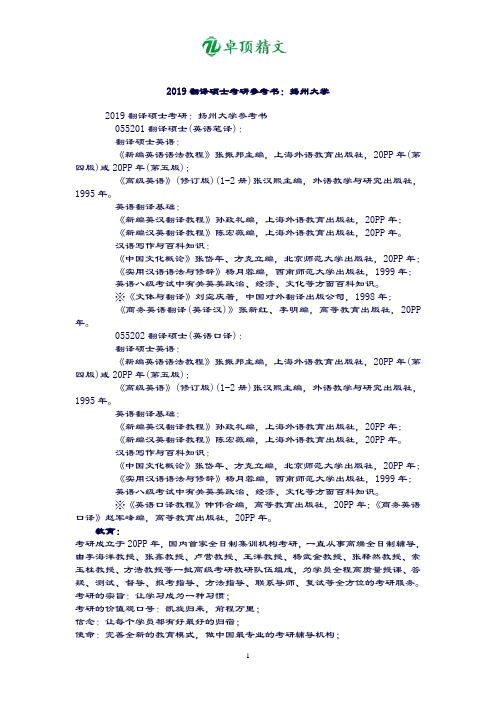
2019翻译硕士考研参考书:扬州大学2019翻译硕士考研:扬州大学参考书055201翻译硕士(英语笔译):翻译硕士英语:《新编英语语法教程》张振邦主编,上海外语教育出版社,20PP年(第四版)或20PP年(第五版);《高级英语》(修订版)(1-2册)张汉熙主编,外语教学与研究出版社,1995年。
英语翻译基础:《新编英汉翻译教程》孙致礼编,上海外语教育出版社,20PP年;《新编汉英翻译教程》陈宏薇编,上海外语教育出版社,20PP年。
汉语写作与百科知识:《中国文化概论》张岱年、方克立编,北京师范大学出版社,20PP年;《实用汉语语法与修辞》杨月蓉编,西南师范大学出版社,1999年;英语八级考试中有关英美政治、经济、文化等方面百科知识。
※《文体与翻译》刘宓庆著,中国对外翻译出版公司,1998年;《商务英语翻译(英译汉)》张新红、李明编,高等教育出版社,20PP 年。
055202翻译硕士(英语口译):翻译硕士英语:《新编英语语法教程》张振邦主编,上海外语教育出版社,20PP年(第四版)或20PP年(第五版);《高级英语》(修订版)(1-2册)张汉熙主编,外语教学与研究出版社,1995年。
英语翻译基础:《新编英汉翻译教程》孙致礼编,上海外语教育出版社,20PP年;《新编汉英翻译教程》陈宏薇编,上海外语教育出版社,20PP年。
汉语写作与百科知识:《中国文化概论》张岱年、方克立编,北京师范大学出版社,20PP年;《实用汉语语法与修辞》杨月蓉编,西南师范大学出版社,1999年;英语八级考试中有关英美政治、经济、文化等方面百科知识。
※《英语口译教程》仲伟合编,高等教育出版社,20PP年;《商务英语口译》赵军峰编,高等教育出版社,20PP年。
教育:考研成立于20PP年,国内首家全日制集训机构考研,一直从事高端全日制辅导,由李海洋教授、张鑫教授、卢营教授、王洋教授、杨武金教授、张释然教授、索玉柱教授、方浩教授等一批高级考研教研队伍组成,为学员全程高质量授课、答疑、测试、督导、报考指导、方法指导、联系导师、复试等全方位的考研服务。
英语笔译(翻译硕士) 学科代码:055201 所属学院代码: 高级翻译学院
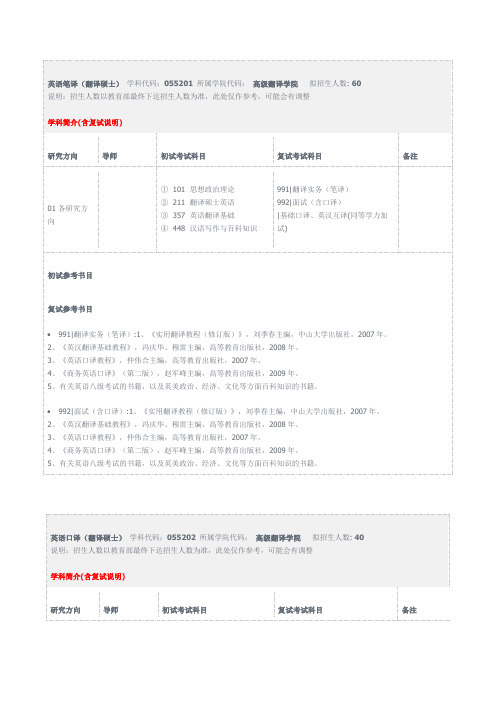
2011年招收攻读硕士学位研究生简章一、培养目标培养德、智、体全面发展,在本学科领域掌握坚实的基础理论和系统的专门知识,具有从事科学研究、教学和独立担负专门技术工作能力的高级专门人才。
二、招生名额学制二至三年,招生计划以教育部下发的实际指标为准,包括非定向生、定向生、委培生、自筹经费生。
实际招生指标以教育部下发指标为准。
三、报考条件报名参加学术型研究生招生全国统一考试的人员,须符合下列条件:(一)中华人民共和国公民。
(二)拥护中国共产党的领导,愿为社会主义现代化建设服务,品德良好,遵纪守法。
(三)年龄一般不超过40周岁(1971年8月31日以后出生者),报考委托培养和自筹经费的考生年龄不限。
(四)身体健康状况符合国家和招生单位规定的体检要求。
(五)已获硕士或博士学位的人员只准报考委托培养或自筹经费硕士生。
(六)考生的学历必须符合下列条件之一:1.国家承认学历的应届本科毕业生;2.具有国家承认的大学本科毕业学历的人员;3.获得国家承认的高职高专毕业学历后,经2年或2年以上(从高职高专毕业到2011年9月1日,下同),达到与大学本科毕业生同等学力,且自考主干课程5门以上成绩合格;4.国家承认学历的本科结业生和成人高校应届本科毕业生,按本科毕业生同等学力身份报考;5.已获硕士、博士学位的人员。
自考生和网络教育学生须在报名现场确认截止日期前取得国家承认的大学本科毕业证书方可报考。
在校研究生报考须在报名前征得所在培养单位同意。
专业学位研究生全国统一考试的报考条件按下列规定执行:(一)报名参加法律硕士(非法学)专业学位研究生招生考试的人员,须符合下列条件:1.符合报考学术型研究生招生全国统一考试条件的各项要求。
2.在高校学习的专业为非法学专业的(普通高等学校本科专业目录法学门类中的法学类专业[代码为0301]毕业生不得报考)。
(二)报名参加法律硕士(法学)专业学位研究生招生考试的人员,须符合下列条件:1.符合报考学术型研究生招生全国统一考试条件的各项要求。
翻译硕士MTI参考书目
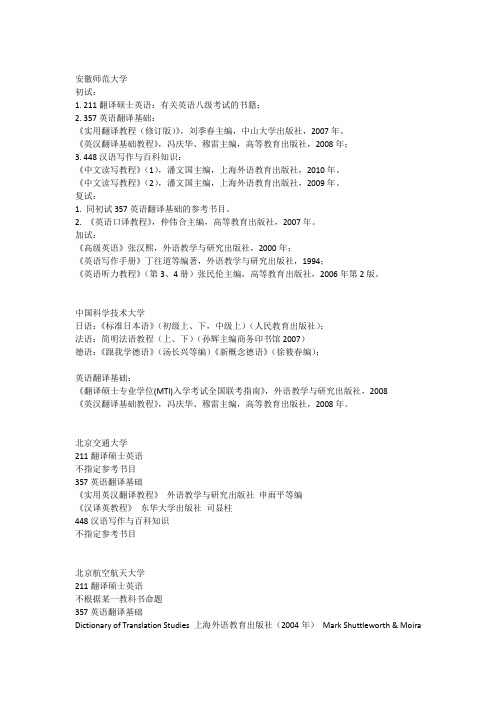
广东外语外贸大学 英语笔译、英语口译 复试参考书目 ? 991|翻译实务(笔译):1、《实用翻译教程(修订版)》,刘季春主编,中山大学出版社, 2007 年。 2、《英汉翻译基础教程》,冯庆华、穆雷主编,高等教育出版社,2008 年。 3、《英语口译教程》,仲伟合主编,高等教育出版社,2007 年。 4、《商务英语口译》(第二版),赵军峰主编,高等教育出版社,2009 年。 5、有关英语八级考试的书籍,以及英美政治、经济、文化等方面百科知识的书籍。 ? 992|面试(含口译):1、《实用翻译教程(修订版)》,刘季春主编,中山大学出版社,2007 年。 2、《英汉翻译基础教程》,冯庆华、穆雷主编,高等教育出版社,2008 年。 3、《英语口译教程》,仲伟合主编,高等教育出版社,2007 年。 4、《商务英语口译》(第二版),赵军峰主编,高等教育出版社,2009 年。 5、有关英语八级考试的书籍,以及英美政治、经济、文化等方面百科知识的书籍。
法语口译 复试参考书目 ? 993|翻译实务(笔译):1、《法语》1-4 册, 北京外国语大学法语系马晓宏等编, 外语 教学与研究出版社,1992 年。 2、《法语》5-6 册 ,束景哲主编, 上海外语教育出版社,1991 年。 3、《法语口译实务(2 级)》,陈伟, 外语出版社,2005 年。 4、《法语口译实务(3 级)》,蔡小红, 外语出版社,2005 年。 5、有关法国文学史、法国当代文化方面的书籍。 ? 994|面试(含口译):1、《法语》1-4 册, 北京外国语大学法语系马晓宏等编, 外语教 学与研究出版社,1992 年。 2、《法语》5-6 册 ,束景哲主编, 上海外语教育出版社,1991 年。 3、《法语口译实务(2 级)》,陈伟, 外语出版社,2005 年。 4、《法语口译实务(3 级)》,蔡小红, 外语出版社,2005 年。 5、有关法国文学史、法国当代文化方面的书籍。
2023年扬州大学研究生自主命题 357英语翻译基础试卷(A卷)考研真题
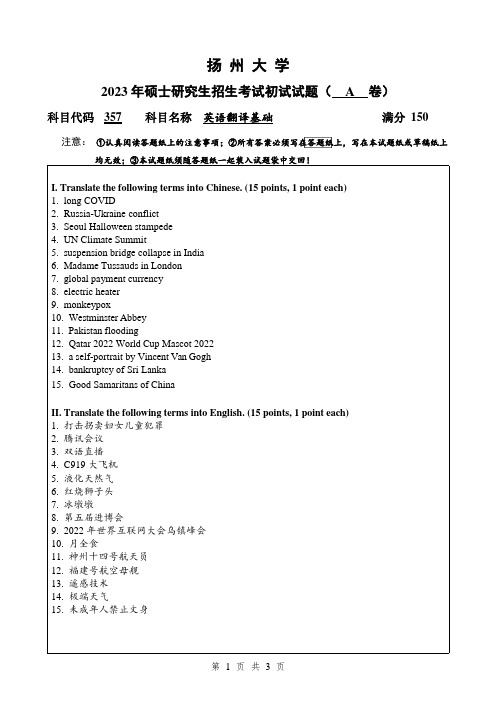
扬州大学2023 年硕士研究生招生考试初试试题( A 卷)科目代码357 科目名称英语翻译基础满分150 注意:①认真阅读答题纸上的注意事项;②所有答案必须写在答题纸上,写在本试题纸或草稿纸上均无效;③本试题纸须随答题纸一起装入试题袋中交回!I.Translate the following terms into Chinese. (15 points, 1 point each)1.long COVID2.Russia-Ukraine conflict3.Seoul Halloween stampede4.UN Climate Summit5.suspension bridge collapse in India6.Madame Tussauds in London7.global payment currency8.electric heater9.monkeypox10.Westminster Abbey11.Pakistan flooding12.Qatar 2022 World Cup Mascot 202213.a self-portrait by Vincent Van Gogh14.bankruptcy of Sri Lanka15.Good Samaritans of ChinaII.Translate the following terms into English. (15 points, 1 point each)1.打击拐卖妇女儿童犯罪2.腾讯会议3.双语直播4.C919 大飞机5.液化天然气6.红烧狮子头7.冰墩墩8.第五届进博会9.2022 年世界互联网大会乌镇峰会10.月全食11.神州十四号航天员12.福建号航空母舰13.遥感技术14.极端天气15.未成年人禁止文身III.Translate the following two passages into Chinese. Write your answers on the ANSWER SHEET. (60 points, 30 points each)Passage OneThe final speaker of the event was Allison Witt, the Director of International Programs in the College of Education where she teaches Global Studies in Education. Witt began by pointing out that higher education has always been global to some extent. The US higher educational model is cobbled together from many other international models. She placed US higher education in the larger context of how the international engagement of the United States has changed from a development focus (post-WWI and WWII) and moved more recently towards the use of Higher Education as a form of soft power. Witt continued her talk by next focusing on study abroad, which she pointed out is tied to benefits for students and communities. The university is seen as a hub of innovation globally and has research relationships with universities around the world. Witt suggested that we need to move towards a collaborative model of global engagements. Teacher education is inherently a collaborative process, as it requires higher education to work with K-12 in equal partnerships to train teachers. Models need to be developed where we work closely with partner institutions and schools, where institutions reciprocally exchange pre-service teachers in local schools, and where local teachers are engaged as both participants and hosts.Passage TwoNostalgia is a recurrent theme in Chinese poetry. An American reader of translated Chinese poems may well be taken aback˗even put off˗by the frequency, as well as the sentimentality, of the lament for home. To understand the strength of this sentiment, we need to know that the Chinese desire for stability and rootedness in place is prompted by the constant threat of war, exile, and the natural disasters of flood and drought. Forcible removal makes the Chinese keenly aware of their loss. By contrast, Americans move, for the most part, voluntarily. Their nostalgia for hometown is really longing for a childhood to which they cannot return: in the meantime the future beckons and the future is “out there”, in open space. When we criticize American rootlessness, we tend to forget that it is a result of ideals we admire, namely, social mobility and optimism about the future. When we admire Chinese rootedness, we forget that the word“place” means both a location in space and position in society: to be tied to place is also to be bound to one’s station in life, with little hope of betterment. Space symbolizes hope; place, achievement and stability.IV.Translate the following two passages into English. Write your answers on the ANSWER SHEET. (60 points, 30 points each)Passage One当我在小学毕了业的时候,亲友一致的愿意我去学手艺,好帮助母亲。
浙江师范大学211-357-448-《翻译硕士日语》《翻译基础》《汉语写作与百科知识》2020年考研专业课初试大纲

全日制翻译硕士专业学位(MTI)研究生入学考试考试总纲总 则全国翻译硕士专业学位教育指导委员会在《全日制翻译硕士专业学位研究生指导性培养方案》(见学位办[2009]23号文)中指出,MTI教育的目标是培养高层次、应用型、专业性口笔译人才。
MTI教育重视实践环节,强调翻译实践能力的培养。
全日制MTI的招生对象为具有国民教育序列大学本科学历(或本科同等学力)人员,具有良好的双语基础。
根据《全日制翻译硕士专业学位研究生指导性培养方案》以及教学司[2009] 22号文件精神,现制定全日制翻译硕士专业学位研究生入学考试大纲。
一、考试目的本考试旨在全面考察考生的双语(外语、母语)综合能力及双语翻译能力,招生院校根据考生参加本考试的成绩和《政治理论》的成绩总分(满分共计500分),参考全国统一录取分数线来选择参加复试的考生。
二、考试的性质与范围本考试是全国翻译硕士专业学位研究生的入学资格考试,除全国统考分值100分的第一单元《政治理论》之外,专业考试分为三门,分别是第二单元外国语考试《翻译硕士X语》(含英语、法语、日语、俄语、韩语、德语等语种),第三单元基础课考试《X语翻译基础》(含英汉、法汉、日汉、俄汉、韩汉、德汉等语对)以及第四单元专业基础课考试《汉语写作与百科知识》。
《翻译硕士X语》重点考察考生的外语水平,总分100分,《X语翻译基础》重点考察考生的外汉互译专业技能和潜质,总分150分,《汉语写作和百科知识》重点考察考生的现代汉语写作水平和百科知识,总分150分。
(考试科目名称及代码参见教学司[2009]22号文件)三、考试基本要求1.具有良好的外语基本功,掌握6000个以上的选考外语积极词汇。
2.具有较好的双语表达和转换能力及潜质。
3.具备一定的中外文化以及政治、经济、法律等方面的背景知识。
对作为母语(A语言)的现代汉语有较强的写作能力。
四、命题由各招生院校MTI资格考试命题小组根据本考试大纲,分别参照翻译硕士外语考试《翻译硕士X语》、基础课考试《X语翻译基础》及专业基础课考试《汉语写作和百科知识》考试大纲及样题的要求,自主负责命题与实施。
357-英语翻译基础-扬州大学2024年硕士研究生初试试卷真题

扬州大学2024年硕士研究生招生考试初试试题(A卷)科目代码357科目名称英语翻译基础满分150分注意:①认真阅读答题纸上的注意事项;②所有答案必须写在答题纸上,写在本试题纸或草稿纸上均无效;③本试题纸须随答题纸一起装入试题袋中交回!I.Translate the following terms into Chinese.(15points,1point each)1.Belt and Road Forum for International Cooperation2.a community of shared developmentrge language model4.show leniency to people who make mistakes5.Global AI Governance Initiative6.movie box office revenue during Spring Festival holiday7.artificial intelligence ecosystem8.World Internet Conference Wuzhen Summit9.International Science and Technology Cooperation Initiative10.at-home care services for the elderly11.International Monetary Fund12.World Youth Development Forum13.Hangzhou Asian Para Games14.regulations to protect minors in cyberspace15.the tiered and classified social assistance systemII.Translate the following terms into English.(15points,1point each)1.世界科幻大会2.普惠金融高质量发展3.全球可持续交通高峰论坛4.火炬传递5.粮食安全保障体系6.“金砖”扩员7.模块化小型核反应堆8.恢复和扩大消费9.防汛救灾工作10.可再生能源装机容量11.文物保护利用12.民营经济13.高标准农田14.数字化转型15.中国-中亚峰会III.Translate the following passages into Chinese.Write your answers on the ANSWER SHEET.(60points,20points each)Passage OneWhen we consider the situation of the human mind in nature,its limited plasticity and few channels of communication with the outer world,we need not wonder that we grope for light,or that we find incoherence and instability in human systems of ideas.The wonder rather is that we have done so well,that in the chaos of sensations and passions that fills the mind we have found any leisure for self-concentration and reflection,and have succeeded in gathering even a light harvest of experience from our distracted labours.Our occasional madness is less wonderful than our occasional sanity.Relapses into dreams are to be expected in a being whose brief existence is so like a dream;but who could have been sure of this sturdy and indomitable perseverance in the work of reason in spite of all checks and discouragements?Passage TwoIt is simple enough to say that since books have classes—fiction,biography,poetry—we should separate them and take from each what it is right that each should give us.Yet few people ask from books what books can give us.Most commonly we come to books with blurred and divided minds,asking of fiction that it shall be true,of poetry that it shall be false,of biography that it shall be flattering,of history that it shall enforce our own prejudices.If we could banish all such preconceptions when we read,that would be an admirable beginning.Do not dictate to your author;try to become him.Be his fellow-worker and accomplice.If you hang back,and reserve and criticize at first,you are preventing yourself from getting the fullest possible value from what you read.But if you open your mind as widely as possible,then signs and hints of almost imperceptible fineness,from the twist and turn of the first sentences,will bring you into the presence of a human being unlike any other.Steep yourself in this,acquaint yourself with this, and soon you will find that your author is giving you,or attempting to give you,something far more definite.Passage ThreeVery ready we are to say of a book,“How good this is—that’s exactly what I think!”But the right feeling is,“How strange that is!I never thought of that before,and yet I see it is true;or if Ido not now,I hope I shall,some day.”But whether thus submissively or not,at least be sure that you go to the author to get at his meaning,not to find yours.Judge it afterwards,if you think yourself qualified to do so;but ascertain it first.And be sure also,if the author is worth anything, that you will not get at his meaning all at once;—nay,that at his whole meaning you will not for a long time arrive in any wise.Not that he does not say what he means,and in strong words too; but he cannot say it all;and what is stranger,will not,but in a hidden way and parables,in order that he may be sure you want it.I cannot quite see the reason of this,nor analyze that cruel reticence in the breasts of wise men which makes them always hide their deeper thought.They do not give it to you by way of help,but of reward,and will make themselves sure that you deserve it before they allow you to reach it.IV.Translate the following passages into English.Write your answers on the ANSWER SHEET.(60points,20points each)Passage One我开始写小说,是在进了女师的第二年,那时刚满十五岁。
